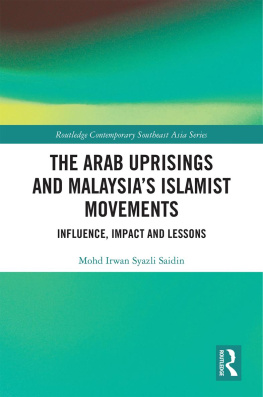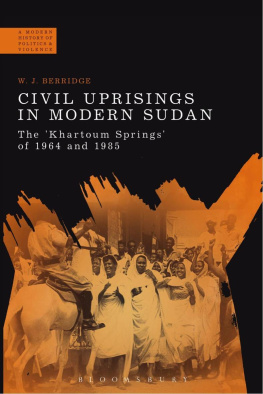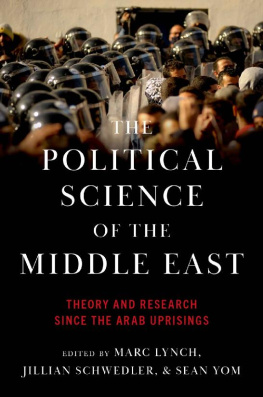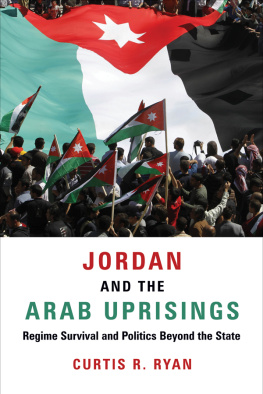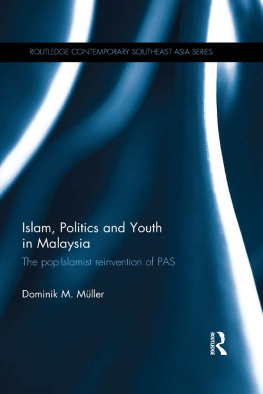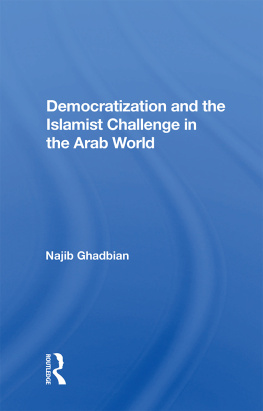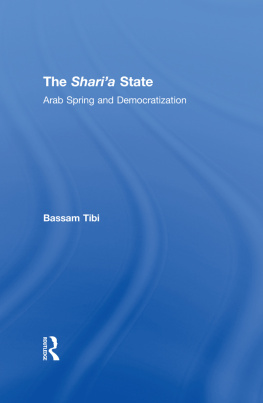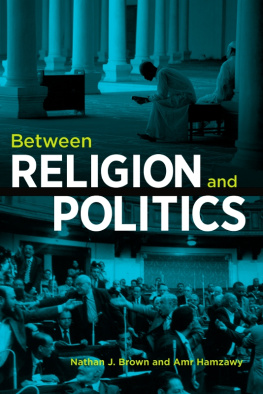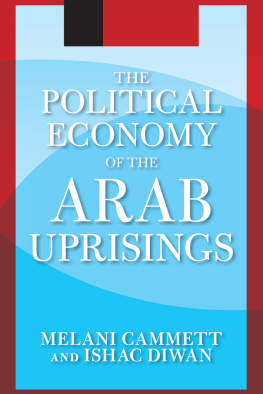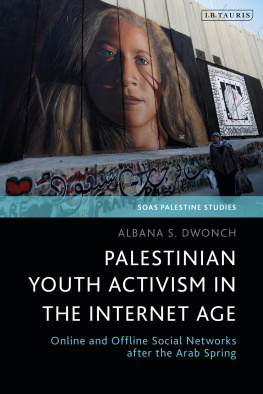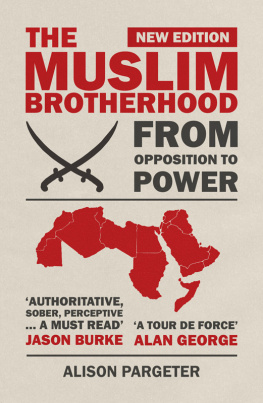The Arab Uprisings and Malaysias Islamist Movements
This book examines the attitude of Malaysias Islamist movements The Pan-Malaysian Islamic Party (PAS); The National Trust Party (AMANAH); The Muslim Youth Movement of Malaysia (ABIM) and the Malaysian Muslim Solidarity Front (ISMA) towards the Arab Uprisings in the Middle East and North Africa.
The book analyses the perceptions of Islamist movement activists, politicians and members in Malaysia towards the 2011 Arab Uprisings, popularly known as the Arab Spring. A questionnaire-based survey as well as in-depth interviews with activists and leaders ranging from individuals in opposing political parties (PAS and AMANAH) to non-government Islamist organisations (ABIM and ISMA) informs the findings of the book. Using quantitative and qualitative methods, the author analyses how the events impacted the activism, political approach and attitudes of the members of Islamic movements towards the issues of regime change, civil disobedience, political revolution, democracy, Islamism and political stability. The book demonstrates that Malaysian Islamists are mainly in support of free and democratic elections as a medium for political change as opposed to overthrowing the previous BN-led regime via civil disobedience, street demonstration or revolution.
A novel approach in examining the connections between Islamic movements in Southeast Asia and the Middle East and Africa, this book will be of interest to academics in the fields of Politics, History, Social Movements, Political Islam, Middle Eastern Studies and Southeast Asian Studies.
Mohd Irwan Syazli Saidin is an Honorary Research Fellow at the Institute of Arab and Islamic Studies, University of Exeter, UK, and a senior lecturer in Middle East Politics in the Faculty of Social Sciences and Humanities, Universiti Kebangsaan Malaysia.
Routledge Contemporary Southeast Asia Series
The aim of this series is to publish original, high-quality work by both new
and established scholars on all aspects of Southeast Asia.
Power Interconnection in Southeast Asia
Anthony David Owen, Anton Finenko and Jacqueline Tao
Contemporary Inter-regional Dialogue and Cooperation between the EU and ASEAN on Non-traditional Security Challenges
Naila Maier-Knapp
Securitising Singapore
State Power and Global Threats Management
Syed Mohammed Adha Aljunied
The European Union and Myanmar
Interactions via ASEAN
Edited by Ludovica Marchi Balossi Restelli
The State and Religious Violence in Indonesia
Minority Faiths and Vigilantism
Aan Suryana
Science and Development in Thai and South Asian Buddhism
David L. Gosling
The Arab Uprisings and Malaysias Islamist Movements
Influence, Impact and Lessons
Mohd Irwan Syazli Saidin
For more information about this series, please visit: www.routledge.com/Routledge-Contemporary-Southeast-Asia-Series/book-series/RCSEA
First published 2020
by Routledge
2 Park Square, Milton Park, Abingdon, Oxon OX14 4RN
and by Routledge
52 Vanderbilt Avenue, New York, NY 10017
Routledge is an imprint of the Taylor & Francis Group, an informa business
2020 Mohd Irwan Syazli Saidin
The right of Mohd Irwan Syazli Saidin to be identified as author of this work has been asserted by him in accordance with sections 77 and 78 of the Copyright, Designs and Patents Act 1988.
All rights reserved. No part of this book may be reprinted or reproduced or utilised in any form or by any electronic, mechanical, or other means, now known or hereafter invented, including photocopying and recording, or in any information storage or retrieval system, without permission in writing from the publishers.
Trademark notice: Product or corporate names may be trademarks or registered trademarks, and are used only for identification and explanation without intent to infringe.
British Library Cataloguing-in-Publication Data
A catalogue record for this book is available from the British Library
Library of Congress Cataloging-in-Publication Data
A catalog record has been requested for this book
ISBN: 978-0-367-42355-1 (hbk)
ISBN: 978-0-367-85403-4 (ebk)
Typeset in Times New Roman
by codeMantra
In loving memory of my grandmother, Sepiah Ibrahim (19192016).
I love you with all my heart, body and soul.
The Arab Uprisings and Malaysias Islamist Movements
The Arab Uprisings and Malaysias Islamist Movements examines the attitude of Malaysias Islamist movements (1) The Pan-Malaysian Islamic Party (PAS), (2) The National Trust Party (AMANAH), (3) The Muslim Youth Movement of Malaysia (ABIM) and (4) the Malaysian Muslim Solidarity Front (ISMA) towards the 2011 Arab Uprisings events. In particular, it explores the knowledge and perceptions of selected Islamist movement activists, politicians and members in Malaysia regarding these protests, also considering how the events impacted their activism, political approach and attitudes towards the issues of regime change, civil disobedience, political revolution, democracy, Islamism and political stability. This book identifies a number of lessons learned by the Malaysian Islamists from the development of post-Arab Uprisings in the MENA.
The tendency of Malaysian Islamists to be influenced by the development in the Middle East and global political Islam is not new, as shown by the 1979 Iranian Islamic Revolution. This popular event was known for its indirect impact on the political activism and approaches of PAS and ABIM in Malaysia in the 1980s and 1990s as well as for inspiring many Malaysian Islamists to uphold the struggle of establishing an Islamic state in their country. Following the recent Arab Uprisings, which also witness the rise of Islamist parties as a ruling power, these events have also been followed by the Malaysian Islamists with great interest. Furthermore, the major involvement of Malaysian Islamists in a series of mass protests, circa 20112016, against the regime were perceived by numerous local and foreign journalists as an attempt to create a Malaysian Spring, inspired by the Arab Spring phenomenon. However, some Malaysian authorities have suggested that there is no basis for presuming that the Arab Uprisings had an impact on the Malaysian experience. This raises questions about the relationship between the Arab Uprisings and Malaysian Islamists. Nevertheless, before jumping to any conclusions about the Malaysian Spring polemics, it must be understood to what extent Malaysian Islamists grasp the fundamental issues of the Arab Uprisings.
Speaking of the global impact of the Arab Uprisings, some elements of political repression, coupled with corruption and power abuse (which some claimed had been practised by the previous Malaysian regime), led to a number of Malaysian Islamists believing that they were inspired by the acts of mass street protests during the Arab Uprisings. This inspiration came when they witnessed the ousting of several long-serving autocratic Arab rulers from their respective positions by the Arab protesters. However, the fear of insecurity and political instability which is currently evident following the Arab Uprisings in Egypt, Libya, Syria and Yemen led to many respondents favouring political stability rather than regime change. Most of them were quite sceptical about the polemics of the Malaysian Spring as most neither disagreed nor agreed that the series of local political rallies were an indirect effort to topple the government. Overall, this empirical study found that the majority of Malaysian Islamists from PAS, ABIM, ISMA and AMANAH are supportive of free and democratic elections as a relevant medium for political change and less supportive of overthrowing the BN-led regime via civil disobedience, street demonstration or revolution.

